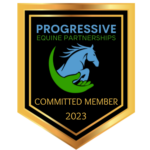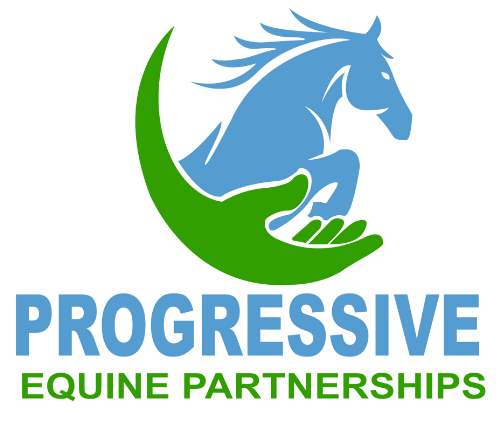Guiding Principles
Recognising ethical practice of the highest standard
Saying 'NO' to pain and fear

To be affiliated with Progressive Equine Partnerships all members must abide by our guiding principles and code of conduct.
- Pain free
To care for and/or train an equine pain free means to commit to not using any equipment, methods or techniques that are physically painful.
- Fear free
To care for and/or train equines fear free means to commit to enhancing their emotional wellbeing by working to reduce fear, stress, and anxiety. Fear free does not mean ignoring or avoiding situations that induce fear, it means not using fear as a means of motivation.
PEP professionals recognise that the definition of pain free, fear free and ethical practice covers the following –
- The physical and emotional wellbeing of the equine is paramount
- No pain or fear is to be applied to better the performance of the equine
- Equines are not to be used for financial gain with no benefit to the equine
- Equines are not to be used for emotional gain at the expense of the equine’s wellbeing.
- Professionals are committed to keeping up to date with the latest scientific research applicable to their field of expertise
Equipment-
Equipment intended to cause pain, fear or restriction of physical ability must not be used in training or behaviour modification, this is non negotiable and such equipment MUST NOT be used by PEP members. Examples of such equipment includes but is not limited to; whips, spurs, draw reins, crank nose bands or those below the bit, side reins, and bungees.
Some equipment is to be used at the members discretion when the overall outcome benefits the equine and/or the partnership. Members are expected to use such equipment mindfully with minimal force and for minimal time and may not use such equipment to inflict pain or fear. Examples of such equipment include but not limited to; bits, bridles, saddles, headcollars, harnesses, boots, and dentistry speculums.
By applying to be affiliated with PEP as a progressive equine professional or establishment, members pledge that–
- I/We will always hold the equines welfare as our top priority.
- I/we will always seek to do no harm.
- I/we will not use any equipment with the intention of causing pain, fear or restriction of physical ability.
- I/we will use my/our knowledge and skills for the benefit of equines and their owners.
- I/we are committed to continued professional development and agree to keep up to date with the latest scientific research within my/our field of expertise.
Additional guiding principles
Freelance grooms
- Take a no pain no fear stance on care and management
- Consider the emotional, physical, and environmental wellbeing of the equine during any and all interactions.
Saddle fitters
- Work for the benefit of the equine ensuring that the horse can move freely and behave normally, free of pain caused by ill fitting saddles.
Bit and Bridle fitters
- Understands that the objective of a Progressive Equine Professional bit and/or bridle fitter is to improve the welfare and comfort of the equine above all else.
Livery
- Livery model should be based on ethical and species appropriate horse keeping.
- The use of any equipment or training methods that cause pain or distress must be discouraged.
Rescue centres and sanctuaries
- Only rescue centres and sanctuaries who are registered as charities or not for profit organisations may be approved.
- If equines are to be rehomed there must be a clear rehoming process and policy with home checks carried out.
- Rehabilitation and training of equines must be ethical and inline with our guiding principles set out above.
Equine assisted therapy centres
- The emotional effect of equines roll in such therapies should be carefully considered with no equine forced to engage in sessions if they are indicating stress or fear.
- Care and management of equines should be based on ethical and species appropriate horse keeping.
Progressive Equine Partnerships Approved
Retail outlets
- Sells no product intended to cause pain, fear, or restriction of physical ability. All products must fit in to the guidance listed below.
– Products are designed with the welfare of the equine in mind.
– Products may be designed to use minimal pressure by way of guidance for the equine but must not be intended to be used as a way of forcing a desired behaviour.
– The intention behind any product must be to aid in a no pain no fear approach to care or training and/or enrich the equine to support natural species appropriate behaviour.
– Equipment must not be intended to cause pain, fear or restriction of physical ability.
Course providers
- Course providers associated with progressive Equine Partnerships must promote ethical practice and encourage and support no pain no fear methods.
- Course must be created by person or persons who are qualified in the subject of the course.
- In the case where not all individual courses can be approved the course provided must make clear to the user that only specific courses are PEP approved. All approved courses must comply with our guiding principles and ethos of no pain no fear.
- Courses related to handling, ground work and/or behaviour modification must not promote the practice of ‘flooding’ in order to ‘desensitise’.
Membership assessment – special considerations
The use of the word ‘Ethics’ / ‘Ethical’
The individual’s definition of ‘ethical’ will vary from person to person. However, PEP has a high standard of ethics and this is an organisation which stands for training and care of equines without the use of pain or fear.
Applications and non-approval
PEP reserves the right to deny applications to those whom are in breach of our guiding principles.
All members are expected to operate within the guidelines of our code of conduct.
1. Members consider the emotional, physical and environmental wellbeing of both equine and client during any and all interactions.
2. Members work only within the boundaries of their knowledge and expertise.
- Members will refer a client to another equine professional and/or make recommendations to the client to seek alternative advice, veterinary care and/or investigation, treatment or training when the equines welfare needs are beyond the members area of expertise.
- Members do not attempt to make any diagnosis outside of their area of expertise.
3. Members must act in a professional manor at all times
- No client information, images or details of treatments are to be shared on social media without the consent of the client.
- Confidentiality may only be breached when there is a concern for welfare. In such instance, the relevant authority should be contacted.
4. Members must be willing to work with other equine professionals when it is in the interest of the equine or withdraw from any engagement with the client.
5. Members may discuss, disagree with or recommend other practices in the equine industry based on current trends, scientific research and evidence available to them.
- Members must remain civil in their discussions and not personally attack another member or client.
6. Members ensure that consent is obtained from the owner of the equine before any treatment or training commences.
- In cases where the equine is on lone to the client, members must ensure the guardian of the equine has consent to make treatment, care and training decisions.
7. Members must offer a clear explanation of the nature and purpose of proposed training, treatment or care and must be able to offer the client explanations and answer questions as to why they will not use or recommend certain methods or equipment.
8. Members agree to hold professional liability insurance.
9. Members agree to stay informed and up to date with the latest scientific research within their field of expertise.
10. By joining Progressive equine partnerships as an equine professional or establishment, members who choose to display our logo understand that they represent our organisation and therefor agree to uphold the highest standards of professionalism and practice with the welfare of the equine always the priority of any and all interactions.
